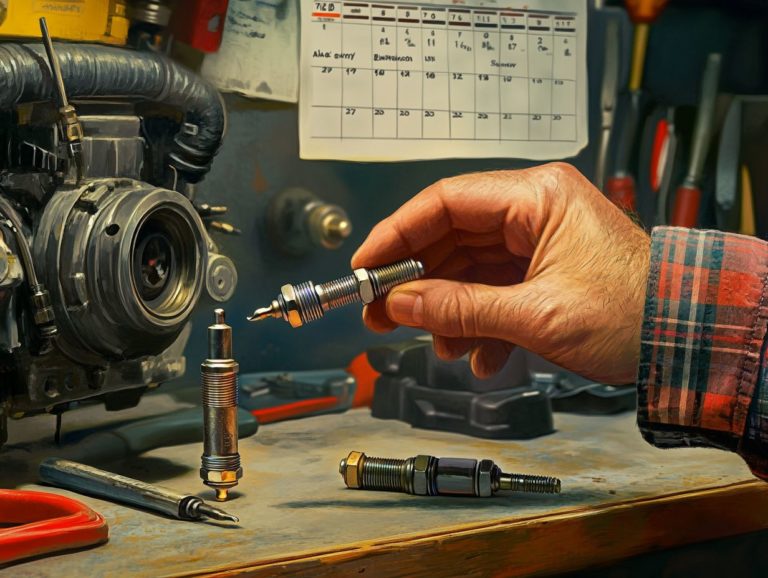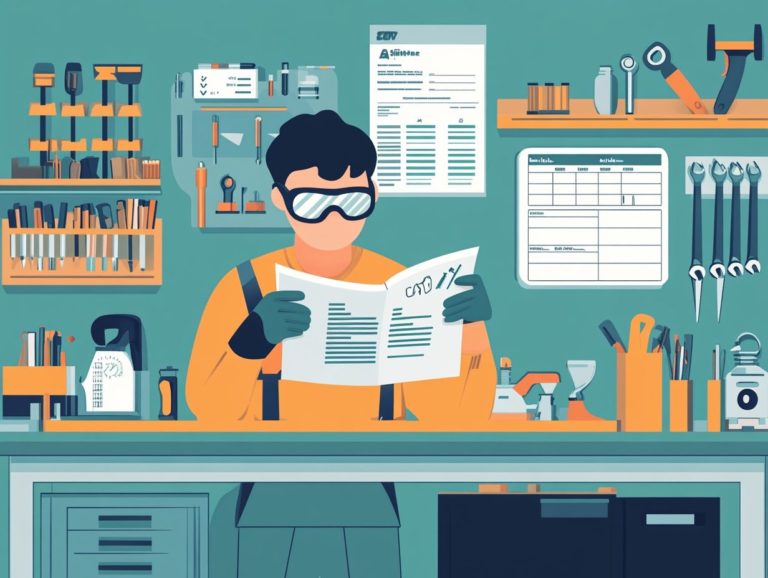The Importance of Brake Fluid Maintenance
Brake fluid is often overlooked, but it plays an important role in your vehicle’s safety and performance.
By understanding what brake fluid is and how it functions, you can take proactive steps to maintain your vehicle effectively. This guide will help you identify warning signs of brake fluid issues and provide essential instructions on how to check and change it properly.
Common myths surrounding brake fluid will be debunked, and you’ll find valuable tips to ensure optimal brake performance. Equip yourself with this vital knowledge to stay safe on the road by mastering the art of brake fluid maintenance!
Contents
- Key Takeaways:
- Understanding Brake Fluid
- The Role of Brake Fluid in Vehicle Safety
- Signs of Brake Fluid Problems
- How to Check and Change Brake Fluid
- Common Myths About Brake Fluid
- Tips for Maintaining Brake Fluid
- Frequently Asked Questions
- What is brake fluid and why is it important to maintain?
- How often should I have my brake fluid checked and replaced?
- What are the consequences of not maintaining brake fluid?
- How can I tell if my brake fluid needs to be replaced?
- Can I check and replace brake fluid myself?
- Is brake fluid maintenance expensive?
Key Takeaways:

- Brake fluid is essential for safe vehicle operation.
- Regular maintenance prevents brake failure and accidents.
- Check and change brake fluid regularly for optimal performance.
Understanding Brake Fluid
Let s explore the basics of brake fluid. Understanding brake fluid is vital for ensuring your vehicle’s optimal brake performance and safety. This liquid used to transfer power in your brakes is essential in your brake system, enabling the efficient sending of force from the brake pedal to the brake components.
This process is crucial for effective braking functionality and overall vehicle safety. Embracing routine maintenance practices centered on brake fluid, including the importance of regular fluid changes, can significantly reduce the risk of brake failure and other related issues, ultimately enhancing your driving safety.
What is Brake Fluid and Its Purpose?
Brake fluid is a specialized hydraulic fluid crafted to transfer force within your brake system, ensuring that your vehicle performs effectively and remains safe on the road.
This essential fluid primarily consists of glycol-based or mineral oil-based compounds, which maintain consistent pressure across the braking components and endure high temperatures generated during braking. You ll encounter three main types of brake fluids: DOT 3, DOT 4, and DOT 5. Each type has unique boiling points and viscosity levels tailored for different vehicular applications.
Brake fluid is crucial as it interacts with your brake pads and calipers, providing the necessary friction to slow down or stop your vehicle.
To keep your brake system in peak condition, it s vital to adopt proper maintenance practices, such as regularly checking for contamination and replacing the fluid according to the manufacturer’s recommendations. This diligence ensures the longevity and reliability of your brake system.
The Role of Brake Fluid in Vehicle Safety
The role of brake fluid in vehicle safety is paramount; it serves as a crucial element in guaranteeing that your vehicle’s braking system operates effectively and reliably. This directly influences not only brake performance but also your overall safety on the road.
Why Proper Brake Fluid Maintenance is Important
Proper brake fluid maintenance is essential for preventing moisture buildup, which can lead to corrosion in your brake system and a decline in brake efficiency. Understanding the importance of regular brake maintenance can help ensure your vehicle remains safe and efficient.
When brake fluid is overlooked, it tends to absorb moisture over time. This creates a perfect breeding ground for rust and corrosion within the brake system. This deterioration not only compromises your braking performance but also increases the risk of sudden brake failure.
It’s crucial to prioritize regular brake fluid changes and inspections to maintain safety on the roads. Implementing a routine maintenance schedule ideally every two years or following the manufacturer’s recommendations is vital for ensuring your system operates effectively.
By focusing on these maintenance practices, you can avoid unexpected repair costs and enjoy a smoother driving experience, ultimately extending the life of your brake components.
Signs of Brake Fluid Problems

Understanding the signs of brake fluid problems is essential for ensuring your vehicle’s safety. Various warning indicators can reveal underlying brake issues that demand your attention and should never be overlooked.
Maintaining your brake fluid is not just a car maintenance task; it’s a key step in ensuring your safety on the road!
Identifying Warning Signs
Identifying warning signs of brake fluid issues can play a pivotal role in preventing serious braking problems and ensuring your vehicle remains dependable. Being alert can keep you safer on the road.
Being attentive to your vehicle’s behavior is essential for maintaining best braking performance. For instance, if you notice a soft or spongy brake pedal when you press down, it could mean there’s air in the brake lines or that your brake fluid levels are low both situations that demand your immediate attention.
Discolored brake fluid is another red flag, indicating possible contamination and hinting at underlying issues within the braking system. If a warning light appears on your dashboard, it means your braking system needs service.
These signs are your cue to either change the brake fluid or conduct a thorough inspection to avoid further complications and ensure safe driving experiences.
How to Check and Change Brake Fluid
Understanding how to check and change brake fluid is key to keeping your brakes in top shape! Deciding whether to take on this task yourself or to enlist the help of professional auto repair services can profoundly affect your vehicle’s safety.
Step-by-Step Guide for Maintenance
This step-by-step guide for maintaining brake fluid is designed to help you ensure your vehicle’s how well your brakes work remains optimal, facilitating efficient inspections along the way.
By adhering to these straightforward procedures, you ll not only extend the lifespan of your braking system but also enhance your overall safety on the road. Checking the brake fluid is essential, as it directly impacts your vehicle’s ability to stop smoothly and effectively. Start by examining the reservoir level, which holds your brake fluid, and the fluid’s consistency, paying close attention to any discoloration or cloudiness that could indicate moisture has entered the system.
Use a clean paper towel or cloth to check for signs of water content; even a small amount can significantly impair braking efficiency. If you detect noticeable degradation in quality, it might be time for a fluid change.
Many vehicle owners can do the initial checks, but it s smart to consult a professional auto repair service if the fluid appears consistently contaminated or if brake performance continues to be a concern, even after maintenance.
Common Myths About Brake Fluid
Dispelling common myths about brake fluid is essential for educating you as a vehicle owner on effective brake maintenance practices. This knowledge not only enhances your understanding but also significantly contributes to overall vehicle safety and performance.
Debunking Misconceptions

Debunking the misconceptions surrounding brake fluid gives you the power to make informed decisions about your vehicle’s brake maintenance and inspections.
Many people mistakenly assume that brake fluid is a one-time purchase something that, once installed, requires no further thought. In reality, each type of brake fluid possesses unique properties and performance characteristics that can significantly influence braking efficiency. It s essential to grasp that not all brake fluids are compatible, and neglecting to change your brake fluid according to the manufacturer’s recommendations can lead to degradation and a noticeable drop in braking power.
By committing to regular inspections and timely replacements, you can ensure that your braking system operates at its best, ultimately enhancing your vehicle’s safety and performance.
Tips for Maintaining Brake Fluid
Implementing effective tips for maintaining brake fluid can dramatically enhance your brake performance, prevent moisture accumulation, and extend the lifespan of your brake system. Follow these fantastic tips and keep your brakes in peak condition!
Best Practices for Long-Term Performance
Adopting best practices for long-term brake fluid maintenance can greatly improve your vehicle’s brake performance and overall safety over time.
Regular inspections are essential. They enable you to identify potential issues before they escalate, ensuring that your braking system operates smoothly.
Timely brake fluid changes prevent moisture buildup, which can undermine braking efficiency. It’s crucial to use high-quality brake fluid products, as inferior alternatives may struggle to meet the demands of varying driving conditions.
Don t wait! Regular check-ups can save you from dangerous brake failure. Seek advice from car maintenance experts. They can provide personalized recommendations on suitable brake fluid products and necessary services, ensuring the longevity and reliability of your braking system.
Frequently Asked Questions
What is brake fluid and why is it important to maintain?
Brake fluid is a fluid that helps your car’s brakes work by transferring force from the brake pedal to the brakes, allowing the vehicle to slow down or stop. Maintaining brake fluid is important because it plays a crucial role in ensuring the safe and effective operation of your vehicle’s braking system.
How often should I have my brake fluid checked and replaced?

It is recommended to have your brake fluid checked and replaced every 2 years or 30,000 miles, whichever comes first. However, if you notice any signs of brake fluid contamination or a decrease in braking performance, it is important to have it checked and replaced immediately.
What are the consequences of not maintaining brake fluid?
Not maintaining brake fluid can lead to a decrease in braking performance, compromising your vehicle’s safety. It can also result in costly repairs and potential brake failure, putting you and others on the road at risk.
How can I tell if my brake fluid needs to be replaced?
If your brake fluid is dark or discolored, has a burnt smell, or contains air bubbles, it is a sign that it needs to be replaced. You can also check your vehicle’s owner’s manual for the recommended maintenance schedule for brake fluid.
Can I check and replace brake fluid myself?
While you can check and replace brake fluid yourself, it is recommended to have a professional do it for you. They have the proper tools and knowledge to ensure the job is done correctly and safely.
Is brake fluid maintenance expensive?
Brake fluid maintenance is relatively inexpensive compared to potential repairs and accidents that can occur if it is neglected. It is a small price to pay for the safety and longevity of your vehicle’s braking system.
Don’t forget to schedule your brake fluid check today!






